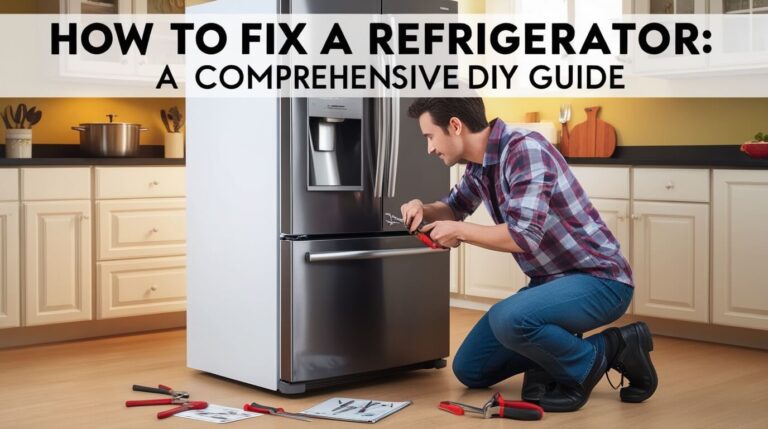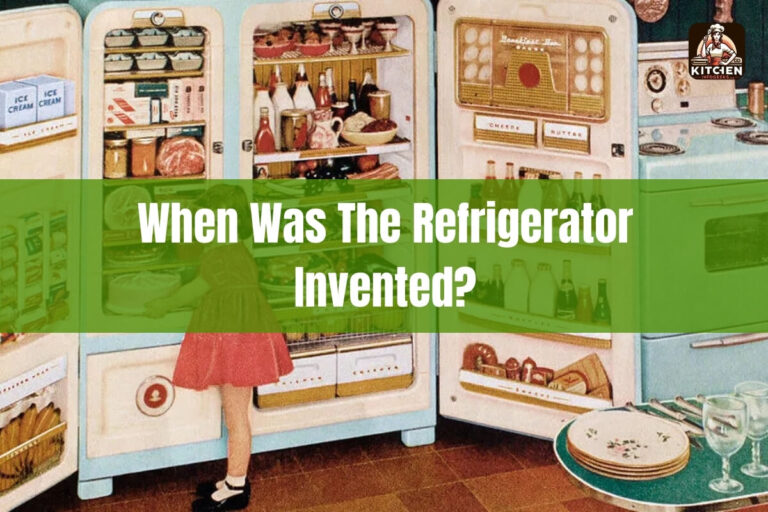
Is your fridge suddenly sounding like a broken record? A noisy refrigerator can be caused by various factors, from normal operational sounds to signs of serious mechanical issues. In this guide, we’ll explore the different types of refrigerator noises, their causes, and how to address them. We’ll also cover when to attempt DIY fixes and when it’s time to call in the pros.
Common Refrigerator Noises: Normal vs. Concerning
Not all refrigerator noises spell trouble. Let’s break down the sounds you might hear and whether they’re cause for concern.
Normal Refrigerator Sounds You Shouldn’t Worry About
- Humming: A low, steady hum is typically the compressor running.
- Clicking: This often occurs when the compressor or thermostat turns on and off.
- Gurgling or bubbling: These sounds happen as refrigerant flows through the cooling system.
- Crackling or popping: Usually caused by parts expanding and contracting with temperature changes.
These noises are part of your fridge’s regular operation. They might seem loud in a quiet kitchen, but they’re generally harmless.
Alarming Noises That Require Attention
- Loud buzzing or humming: This could indicate a failing compressor or fan motor.
- Rattling or vibrating: Often a sign that your fridge isn’t level or a part is loose.
- Grinding or scraping: These harsh sounds might mean a fan blade is hitting ice or another object.
- Clicking that doesn’t stop: If the clicking is constant, it could be a sign of a failing start relay.
If you hear these noises, it’s time to investigate further or call a professional.
Identifying the Source of Your Noisy Refrigerator
To fix a noisy fridge, you first need to pinpoint where the sound is coming from. Let’s look at common sources of refrigerator noise.
Compressor-Related Noises
The compressor is the heart of your fridge’s cooling system. It can make various noises:
- A loud humming or buzzing might mean the compressor is overworking or failing.
- Clicking sounds could indicate issues with the compressor’s electrical components.
- Knocking or banging noises might be a sign of compressor damage.
Fan Motor Sounds
Your fridge has two main fans: the evaporator fan in the freezer and the condenser fan near the compressor.
- A loud, continuous fan noise could mean a failing motor or a blade hitting something.
- Squealing sounds often indicate that the fan motor bearings are wearing out.
Ice Maker and Water Dispenser Noises
If you have an ice maker or water dispenser, they can create their own unique sounds:
- Clicking or humming as the ice maker fills with water is normal.
- A loud buzzing when dispensing water might mean the water inlet valve needs replacing.
- Rattling in the ice bin is usually just ice cubes settling.
Defrost System Sounds
The defrost system prevents ice buildup on the evaporator coils:
- Sizzling or dripping noises during defrost cycles are normal.
- Loud snapping or popping during defrost could indicate an issue with the defrost heater.
Troubleshooting a Loud Refrigerator: DIY Solutions
Before calling a repair service, try these DIY fixes for a noisy fridge:
Cleaning Condenser Coils
Dirty condenser coils make your fridge work harder, causing more noise. To clean them:
- Unplug the refrigerator.
- Locate the coils (usually at the back or bottom of the fridge).
- Use a coil brush or vacuum to remove dust and debris.
- Plug the fridge back in and listen for improvement.
Leveling Your Refrigerator
An uneven fridge can cause rattling and vibration. To level it:
- Remove the kick plate at the bottom front of the fridge.
- Adjust the leveling screws or rollers until the fridge is level.
- Use a spirit level to check both side-to-side and front-to-back.
Checking and Replacing Door Gaskets
Worn door gaskets can cause the compressor to run more often. To check and replace:
- Inspect the gaskets for cracks, tears, or gaps.
- Clean the gaskets with warm, soapy water and dry thoroughly.
- If damaged, measure and order replacement gaskets.
- Install new gaskets following the manufacturer’s instructions.
Addressing Ice Build-up Issues
Excessive ice can cause fan blades to hit ice, creating noise. To fix:
- Remove all food from the freezer.
- Unplug the fridge and allow it to defrost completely.
- Check the defrost drain for clogs and clear if necessary.
- Once defrosted and dry, plug the fridge back in.
When to Call a Professional for Your Noisy Fridge
While DIY solutions can often solve minor issues, some problems require expert help.
Signs of Serious Refrigerator Problems
Call a professional if you notice:
- Persistent loud noises even after DIY attempts
- The fridge isn’t cooling properly
- Unusual odors or signs of burning
- Water leaking inside or around the fridge
Costs of Professional Refrigerator Repair
Professional repair costs vary based on the issue and your location. Here’s a rough guide:
- Compressor replacement: $500-$1000
- Fan motor replacement: $200-$500
- Control board repair: $150-$400
- Defrost system repair: $200-$400
Always get multiple quotes and check warranties before proceeding with repairs.
Preventing Future Refrigerator Noise Issues
Regular maintenance can keep your fridge running quietly and efficiently.
Regular Maintenance Tips
- Clean condenser coils every 6-12 months.
- Check and clean door gaskets monthly.
- Defrost manual-defrost freezers when ice buildup exceeds 1/4 inch.
- Keep the fridge and freezer at optimal temperatures (usually 37°F for fridge, 0°F for freezer).
Best Practices for Refrigerator Use
- Don’t overload your fridge. Good air circulation reduces strain on the compressor.
- Let hot foods cool before refrigerating to prevent overworking the compressor.
- Keep your fridge away from heat sources like ovens or direct sunlight.
- Regularly check for and remove any ice buildup in the freezer.
Choosing a Quiet Refrigerator: What to Look For
If you’re in the market for a new fridge, consider these factors for a quieter kitchen:
Noise Ratings and Energy Efficiency
- Look for fridges with low decibel (dB) ratings. Anything under 40 dB is considered quiet.
- Energy-efficient models often run more quietly due to better insulation and compressor technology.
Features That Contribute to Quieter Operation
- Variable speed compressors adjust cooling power as needed, reducing noise.
- Dual evaporators separate fridge and freezer cooling, reducing fan noise.
- Better insulation not only improves energy efficiency but also muffles internal noises.
Conclusion
A noisy refrigerator can be more than just an annoyance—it might signal underlying issues that could affect your fridge’s performance and lifespan. By understanding the different types of refrigerator noises, their potential causes, and how to address them, you can keep your fridge running smoothly and quietly.
Remember, regular maintenance is key to preventing many noise issues. Clean those coils, check those gaskets, and keep an ear out for any unusual sounds. When in doubt, don’t hesitate to call a professional. A little attention now can save you from bigger headaches (and repair bills) down the line.
With these tips and insights, you’re well-equipped to tackle refrigerator noises head-on. Here’s to quieter kitchens and cooler food!






